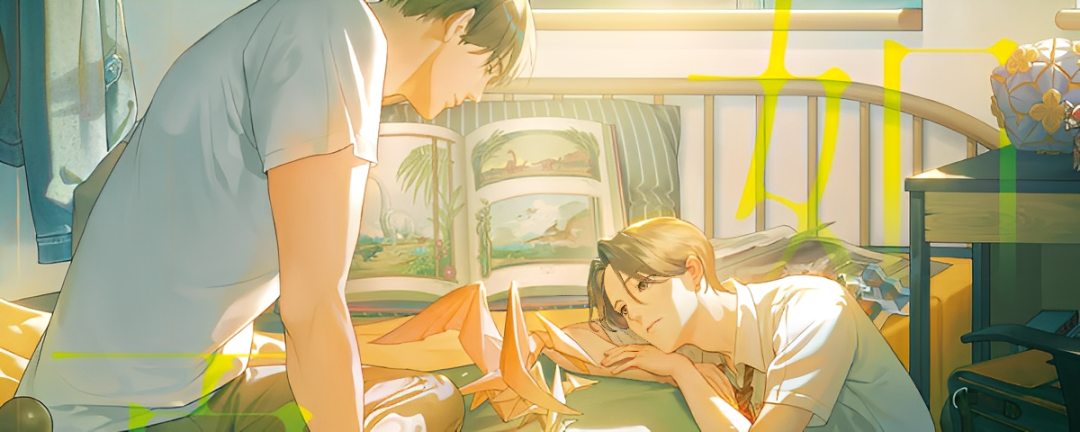BOSF 031: The Cute Boy Next Door
by cloudiesIn the last month of the summer break before his second year of high school, Ji Yan had a small argument with his parents. The cause was choosing his academic track. At his school, students were grouped by track in their second year, deciding what field they’d pursue in university.
Ji Yan wanted to join the humanities track, suited to his personality and interests, as he wasn’t cut out for science or engineering. His parents disagreed, believing the science track offered better job prospects and higher earnings. Both sides stood firm, neither willing to yield.
Initially, Lin Yueqin didn’t care much, saying he could choose either. But out of concern, she started asking around. Their remote village, with poor transportation, saw many young people leave and rarely return after university or entering the workforce.
Lin Yueqin heard about a villager’s child who’d recently started university with good grades and got into a top school. She visited their home, asking about the child’s major and track choice. Parents bond over kids, and despite being strangers, they opened up.
The couple had a daughter, who, like many girls, chose humanities. They said she’d done well initially, but nearing graduation, she worried about finding work. To most, humanities seemed to lead to clerical jobs—secretaries or assistants—or, at best, teachers, accountants, or lawyers. Language majors could become translators. But their daughter studied Chinese literature, prompting parents to question, “Do you even need to study Chinese?”
Having raised a child, parents often think they know best, speaking confidently. “I told her not to study Chinese, but she wouldn’t listen. I let her choose what she liked, not wanting to interfere too much. Now she regrets it…”
Lin Yueqin, with little education, was learning this for the first time. Eager to gain insight, she visited other parents, asking about their children’s paths. Their advice was similar: practical choices prioritized future careers. Some complained their kids earned low salaries as junior employees, working overtime; more open-minded ones said it didn’t matter what their kids did, as long as they could support themselves.
The consensus was clear: boys in the science track had better prospects.
Lin Yueqin, limited by her small social circle of similar parents, absorbed their advice: “Ji Yan’s so good at studying; he should choose his track carefully to avoid regrets.”
In her generation’s view, studying well equaled intelligence. A bit proud, she began seriously planning for Ji Yan.
Back home, she lectured him, citing village examples, insisting he’d regret not listening. She grew firm, meddling in his choice to prevent mistakes. “What future is there in humanities? If you want to be a teacher, fine.”
Ji Yan, introverted, couldn’t imagine teaching—he got nervous just speaking in class. “Being a teacher isn’t necessarily good.”
“Then tell me, what do you want to do?”
Ji Yan was stumped. He knew humanities suited him but hadn’t thought about a specific career.
Every kid faces confusion on the path to choosing a career. Raised to prioritize studying, they’re suddenly asked, “What do you want to do?” Who wouldn’t be lost? Not every child knows their passions early on, and interests are often dismissed by adults as impractical, “not something you can make a living from.”
Raised strictly, Ji Yan had few hobbies or toys. Expecting him to know his future was unrealistic.
How could he judge if he liked something he’d never tried?
Ji Yan compromised but didn’t give in. He even wavered, wondering if science was better.
Troubled and unsure, he went to Xiang Yang that afternoon. Twirling his pen, staring at his books, he tried to focus but gave up, sitting on the bed to watch Xiang Yang fold origami.
Xiang Yang sat on the floor, head slightly bowed, revealing the graceful curve of his neck. His long fingers moved deftly over paper, eyes fixed, blinking slowly.
Ji Yan didn’t know how Xiang Yang knew he loved origami—it seemed to happen naturally, like realizing Xiang Yang’s feelings for him. He’d doubted it once, thinking he’d misunderstood, but crossing that line made it clear: Xiang Yang’s affection was pure and unique. His devotion, folding all day, was admirable in its own way.
Watching, Ji Yan shifted from sitting to lying on his stomach, inching closer.
Xiang Yang’s folding slowed, his expression showing slight disturbance—not annoyance, but difficulty. He could ignore anyone else, but Ji Yan’s closeness always caught his attention.
Finding it fun, Ji Yan teased him, hugging his neck and kissing his cheek with a loud pop, laughing at himself.
Xiang Yang touched his face, setting down his work to lean in, but Ji Yan playfully pulled back, smugly ruffling his hair and chin.
Xiang Yang’s hair was mussed but still handsome, letting Ji Yan do as he pleased.
Unable to resist, Ji Yan kissed him again, lingering gently this time.
After their play, Xiang Yang couldn’t focus on folding.
Looking at the scattered origami, Ji Yan recalled the bookstore’s origami manuals. If those could be published, Xiang Yang’s work—beautiful and skilled—deserved appreciation too.
Ji Yan got off the bed, picked up an origami rabbit, and posed it by the window for photos. Wanting to showcase Xiang Yang’s work online, he struggled to capture its charm. After many angles, he got a decent shot and posted it on his social media, captioning it simply: The Cute Boy Next Door.
The photo got a few likes from friends but no shares, soon buried by newer posts.
Ji Yan hadn’t aimed for anything big—just a memento. His poor photography skills didn’t make it stand out.
But when he showed Xiang Yang, he studied it intently.
“Do you like the photo I took?” Ji Yan asked.
Xiang Yang rarely spoke, even after practicing. But when he wanted to express something, he would. “Like.”
His response made Ji Yan take it seriously. He considered making an account for Xiang Yang to share his work.
A doer, Ji Yan found it simple. He created an account but hesitated over the username. Real names were risky with online scams. Smiling, he recalled his caption and named it: The Cute Boy Next Door.
Biased and smitten, Ji Yan thought Xiang Yang was truly adorable.
Using the account, he re-uploaded the photo, guiding Xiang Yang’s hand to press the confirm button.
The post went live, dated August 22.
Staring at the date, Ji Yan’s thoughts wandered to his upcoming track choice and university in two years, which would separate him from Xiang Yang. Hugging him, he struggled to explain. Though it was early, he didn’t want to leave without warning again. He wanted Xiang Yang prepared, to know their separation would be temporary. “Xiang Yang, when I go to university… I might have to go far away.”
Xiang Yang, perhaps not fully understanding, listened quietly. Ji Yan held him tightly, and Xiang Yang hugged back just as firmly.
“It’s still early, so we don’t need to think too much. I want to take you away from here someday, to be together, okay?”
Ji Yan was genuinely worried, falling back on his habit of confiding in Xiang Yang, unaware his words sounded like a confession. To him, it was only a matter of when to say them.
Xiang Yang might not grasp much, but he caught one phrase: “be together.” This time, he didn’t stay silent, his lips moving before he answered, “Okay, together…”
He said it once, but in his heart, he repeated it countless times. The thought took root, the seed for him to grow into a towering tree.


0 Comments